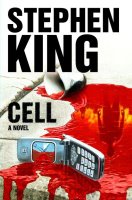Ex Libris: Of Fathers, Zombies and other Sentimental Things
(This was supposed to be a Father's Day special but am late as usual.)
Best-selling author Stephen King has always held a special place in this reader's heart, having been brought up on King's short stories like "The Mist" and the Bachman books thanks to my father. In fact, most of my short fiction has been informed by this upbringing with any speculative element in my stories being composed of horror first and fantastical second. Ironically, my father-- who's read all two of my published stories-- terms them as those "weird stories" which I find quite funny. Ah well.
Which brings me to my first point: fathers influence their children in ways they can't imagine.
Anyway, so when King's latest horror Cell work came out, I had the chance to buy the hardcover copy for him. Unfortunately, I have the bad habit of borrowing his books after he'd done with them and this was no exception.
In his latest work, King has not lost his touch as he goes back to an earlier effort reminiscent of The Stand, the end-of-the-world-as-we-know-it (also known as apocalyptic) fiction in a homage to George Romero's zombie flicks . In this case, King tackles an ubiquituous aspect of our life which is the cellular phone: everyone has one and everyone uses one.*
In what is described in King's trademark normal day, a series of Pulse through cell phones has managed to make their users into ravening zombie-like maniacs. For struggling illustrator Clayton Riddell, this is painfully ironic as he has just made his big break into the comic business (actually with Dark Horse comics). Now all Clayton can do is survive in order to find out if his wife and son managed to survive the violent onslaught.
Unfortunately, as Clayton learns, this isn't your regular zombie-disaster event. As the days go by, the survivors (or normies) find out the rules necessary for any apocalyptic scenario: traveling by night, leaving out shoes in front of the houses, etc. However, they find out the horror isn't over as they learn the zombies (or phoners) are evolving. As the pages go by, it soon becomes a race among the survivors to find out how the phoners are changing or else face extinction at the blood-stained hands of this new kind of human.
All in all, this is King back at his best with old-school horror after his turn with psychological horror (i.e. Gerald's Game and the rest) and his dark western fantasy (i.e. the Dark Tower). Likewise, since this is a zombie story with a twist, King tries to bring something new to the table ala Shaun of the Dead and 28 Days Later. With lots of gore and action and more intensely-paced, he succeeds quite admirably here as he manages to turn enough people into zombie-esque monsters on the day of the Pulse for a proper city-burning and flesh-chomping scenario (something I've always wondered how it happened in the remake of Dawn of the Dead.)
But it's not all action as King infuses his protagonists with a realness that makes you afraid for them as they face the gibbering hordes of monsters. (Whether or not this is great characterization of course is one of the arguments between pro- and anti-King proponents.) Unfortunately, Clayton becomes a bit of a cipher later on in the story and it is the secondary characters who take center stage, whether it's the frail teenager Alice who saw her mother garnish their taxi driver or the aging school headmaster Charles Ardai who has figured out the secret of the phoners. This is too bad as it's Clayton's love as a father that drives the characters from beginning 'til the end of the story. But this may be only nitpicking on my part and everything is all good about the book.
I suppose you could accuse me of thinking that King can do no wrong; however, I'll be the first to admit that I've actually wasn't able to finish a handful of his books, including the Dark Tower sequence. On the other hand, I'm feeling particularly fanboy-ish as this is the first time I've seen King tip his hat to his fellow writers in the speculative fiction trench, citing science fiction writers like William Gibson and Bruce Sterling.
Which brings me to my second point: for someone like myself who has a childhood fear of zombies, having King writing a zombie-esque story is like having your father tell you that particularly scary story at bedtime. But since your father is there, you know everything will be alright and that you'll be able to sleep at night. And true enough, I didn't have any bad dreams about this book.
*Of course King mustn't have heard of the Philippines, whose people have a tendency to text more rather than call. Yes, even in an emergency. After all, we're the text capital of the world. But I digress...

2 comments:
Confession: I haven't finsihed a Stephen King Book. I bought loads, The GreenMile, Rose Madder, Dolores Clairborne, but I think they're too much and tepid.
So I might just try Cell.
Yikes. Poor you. It just so happens the titles you mentioned was King's pscyhological phase (i.e. the horror was mostly psychological). Talk about bad timing (and buying!).
Post a Comment